
The conversational ai trend is growing at an unprecedented rate, with chatbots leading the charge.
In fact, according to recent Statista, the worldwide chatbot market is projected to reach a staggering $454.8 million in revenue by 2027. This marks a massive increase from just $40.9 million in 2018.
As we approach 2023, it's clear that conversational AI is becoming an increasingly integral part of our daily lives, from personalized conversational ai trends customer service experiences to streamlined business processes. In this blog post, we will explore the top conversational AI trends that are expected to shape the industry in 2023 and beyond.
The Cost-Effective Approach to Conversational AI: Buying Over Building
The world of conversational AI is rapidly evolving, and businesses need to keep up with the latest trends to stay ahead in 2023. One of the significant shifts we're seeing is a move away from building custom conversational AI solutions towards purchasing pre-built solutions.
The cost of developing and customizing a conversational AI platform from scratch is a major factor that businesses consider when deciding between building or buying. Developing a custom platform requires a significant investment in both monetary and manpower resources. Many organizations struggle with a lack of AI expertise, which means they must either hire external AI professionals or invest significant time and resources to train their internal employees. This process can be tedious, costly and time-consuming.
On the other hand, purchasing a pre-built conversational AI solution is often more cost-effective as it requires fewer resources to launch. Third-party solutions come with pre-defined workflows, which means there's no need for additional training or data cleansing. These solutions can self-learn from existing knowledge bases and data sources, quickly ingesting historical data and continuously learning from every interaction. This eliminates the need for constant human intervention, freeing up employees to focus on more productive tasks.
Chatbots Are the Future of Customer Interaction
In today's fast-paced world, consumers are seeking quick and personalized interactions with brands, and conversational AI chatbots are proving to be the perfect solution for meeting this demand. 59% of global shoppers prefer messaging services to place orders and complete purchases.
In fact, chat has become the go-to platform for 40% of consumers when shopping online. This presents a massive opportunity for brands to tap into this market by leveraging conversational AI chatbots for messaging platforms such as Facebook Messenger, Instagram, and WhatsApp.
By implementing chatbots, brands can offer personalized interactions with customers on the platforms where they are spending the most time. A well-thought-out chatbot marketing strategy can transform messaging platforms into top channels for acquiring, selling, and retaining customers. Sales through social platforms are projected to be worth an astounding $605 billion by 2027, making the use of conversational AI chatbots more critical than ever before.
Conversational AI Across Work Functions
Conversational AI solutions are transforming the way businesses operate, not just in terms of customer service, but also with their internal workforces. With high call volumes and escalating support requests, service agents can become overwhelmed, reducing their productivity, efficiency, and overall morale. Conversational AI solutions empower both employees and customers to serve themselves, reducing call and support request volumes and allowing service agents to focus on higher-value tasks. This shift in focus reduces workplace stress and boosts productivity and operational efficiency.
HR departments also benefit from Conversational AI solutions by streamlining repetitive processes such as onboarding and employment verifications. These solutions enable HR teams to focus on meaningful activities, such as ensuring employees are safe and well-equipped to work comfortably and productively. By automating these routine tasks, HR departments can deliver efficient resolutions to specialized employee inquiries and develop strategies to reduce workplace risk.
Conversational AI solutions not only benefit customers but also create a more productive and efficient work environment for employees, improving overall business operations.
Personalized Experiences with Conversational AI: Fulfilling Customer Expectations
In today's world, customers expect personalized experiences from the brands they interact with. 80% of customers are more likely to purchase from a brand that offers personalization. Conversational AI is constantly evolving to meet these expectations at scale. With the help of a powerful recommendation engine, AI chatbots can be trained to provide expert-like guidance, understand the intent behind the purchase, offer relevant buying suggestions, and suggest the right add-ons at the right time. This not only improves the overall customer experience but also helps in building long-lasting relationships with customers.
The Rising Popularity of Digital Voice Assistants (Voicebots)
As technology continues to evolve, so does the popularity of digital voice assistants (Voicebots). It is projected that by 2024, there will be 8.4 billion units of digital voice assistants in use. Customers have come to see these assistants as valuable tools to help them complete daily tasks more efficiently. Common use cases for voice assistants include answering queries, sending messages, shopping, and more. As the popularity of these devices continues to rise, manufacturers are investing heavily in improving their performance, making them more reliable for critical operations.
Contact Centers Are Increasingly Using Conversational AI
As per Gartner's forecast, conversational AI has the potential to revolutionize contact center operations, resulting in significant cost savings for organizations. By 2026, the deployment of conversational AI solutions is expected to reduce agent labor costs by a whopping $80 billion. With an estimated one in ten agent interactions projected to be automated by 2026, conversational AI is set to transform the customer service and support landscape.
However, despite the substantial benefits of the technology, its adoption is expected to be measured due to a fragmented vendor landscape and the complexity of deployments. Nevertheless, it is predicted that within two years, conversational AI will deliver transformational benefits to customer service and support organizations.
To Sum Up
Conversational AI is poised to continue its rapid growth and evolution in 2023 and beyond. Businesses are increasingly turning to cost-effective pre-built solutions rather than building custom conversational AI platforms from scratch. Chatbots are becoming an essential component of customer interaction, offering personalized experiences and driving sales through social platforms.
Conversational AI is also transforming work functions, streamlining processes and increasing productivity. Moreover, conversational AI is delivering personalized experiences that are meeting customer expectations at scale. Finally, the rising popularity of digital voice assistants is transforming the way customers complete daily tasks, with manufacturers focusing on improving their performance for more critical operations. These trends represent exciting opportunities for businesses to improve customer experiences, increase efficiency and drive growth in the years ahead.






